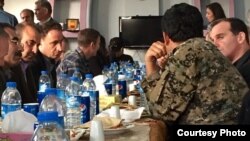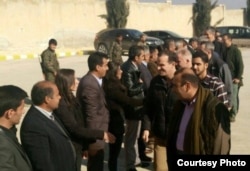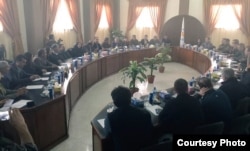U.S. Presidential Envoy to Anti-Islamic State Coalition Brett McGurk visited northern Syria during the weekend to meet with local leaders, Kurdish and U.S. officials said Monday.
McGurk's previously undisclosed visit came under tight security late Saturday and is the first visit by a top U.S. diplomat to the war-torn country since former U.S. ambassador to Syria Robert Ford left Damascus in 2012.
McGurk traveled to Kobani, a town that witnessed one of the fiercest battles between Kurds and Islamic State (IS) militants last year and is now under Kurdish control.
Anwar Muslim, the head of local government, said McGurk talked of bolstering Kurdish forces against IS.
"[We] discussed next steps in Syria campaign [with] battle-tested and multi-ethnic anti-ISIL fighters," the U.S. diplomat said in a tweet about his visit, using an acronym for the Islamic State.
Kobani last week celebrated the first anniversary of its liberation from IS militants.
McGurk visited a cemetery for Kurdish fighters who died defending the city where are buried.
"[I] paid respects to over 1,000 Kurdish martyrs from Kobani battle," he tweeted. He also posted some pictures of his visit in the city.
The city has become a symbol of resistance in the face terror, Kurdish officials say.
"Kobani does not only belong to us now. They [U.S. delegation] visited here because they played an important role in defeating Daesh [IS] in this city," Muslim told VOA.
In order to reach the border town of Kobani, McGurk and his delegation crossed into Syria from the Kurdistan region of Iraq, according to a local activist who insisted on anonymity. McGurk took a 400-kilometer drive to Kobani, a route that was not possible a few months ago because IS militants were in control of areas between the Kurdish regions.
With the help of the U.S.-led coalition, Kurdish forces retook most of these areas, including the strategic town of Tel Abyad in June 2015, making travel easier between Iraqi Kurdistan and much of Kurdish regions in Syria.
The U.S. delegation in Kobani also met with commanders of YGP, a Kurdish force active in ground fighting against IS.
The partnership between the international coalition and local forces in northern Syria has weakened IS and pushed the group from most of the areas it controlled in 2014, local officials say.
"Our partnership is improving," Muslim said.






